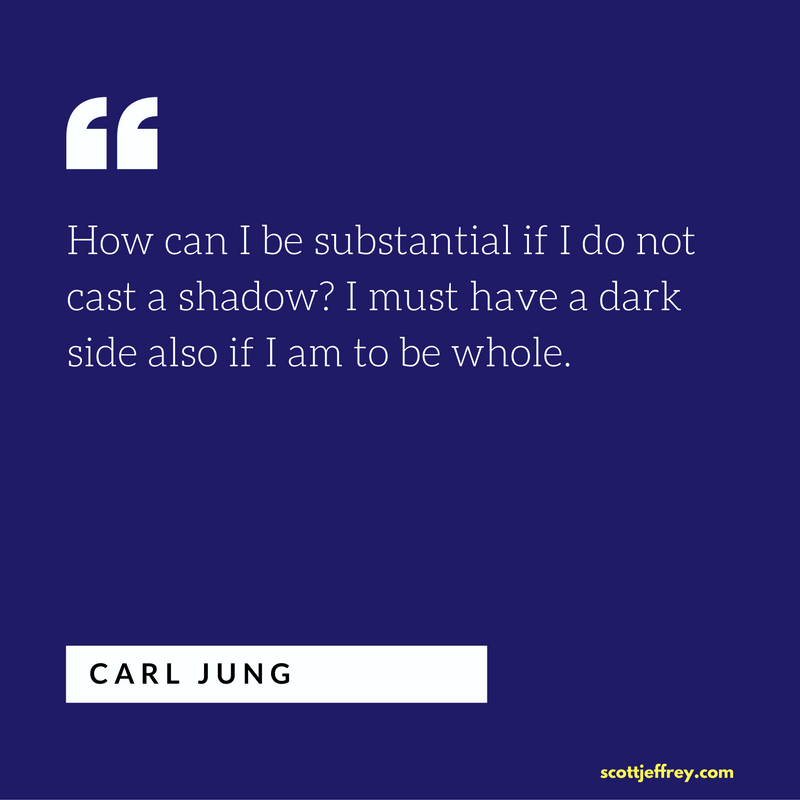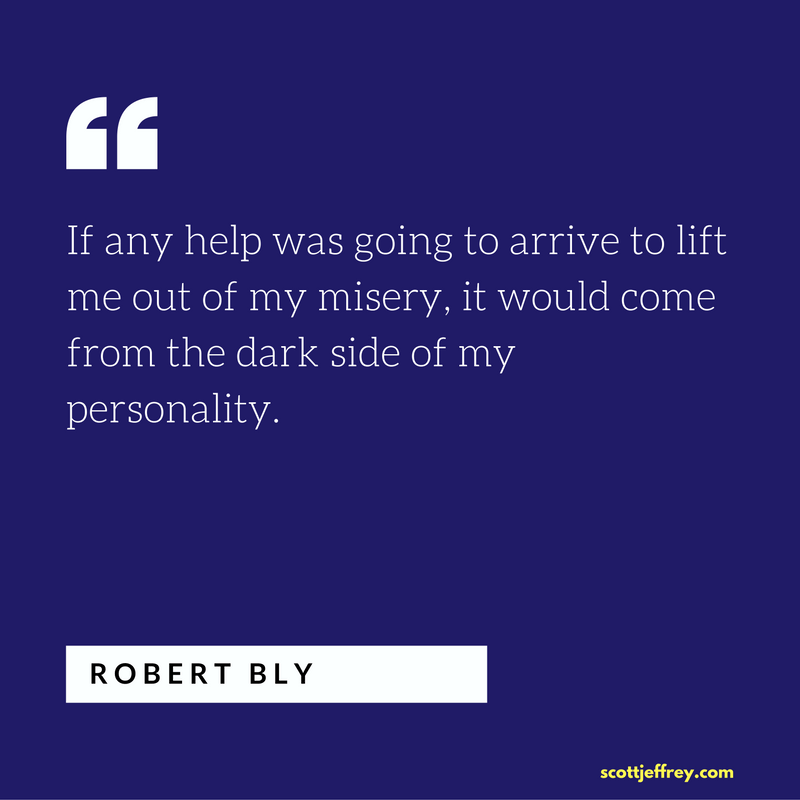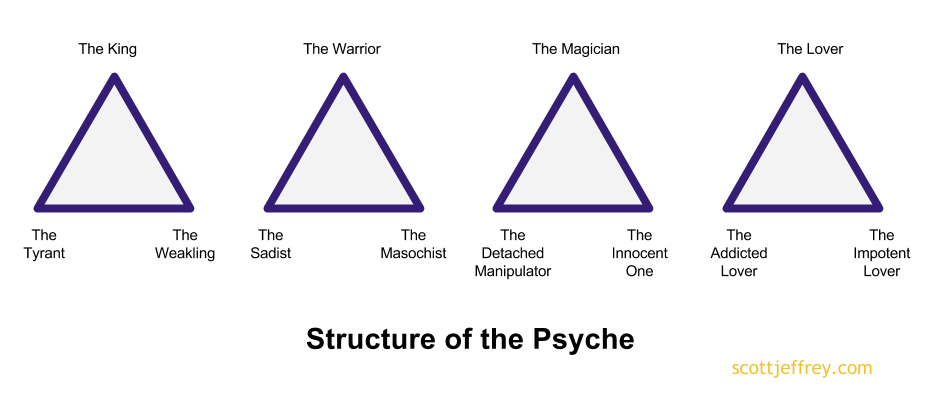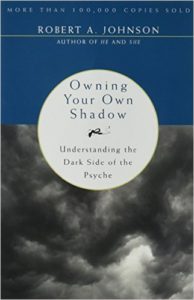How to Know God Chosen You for Something Great
OVERVIEW: This guide explores the nature of the shadow and provides tips and exercises for daily shadow work.
______________
It's always standing right behind usa, simply out of view. In whatever direct light, we cast a shadow.
The shadow is a psychological term for everything we tin can't run into in ourselves.
I understood how important knowing my shadow was when I wrote a biography of a spiritual teacher.
Nigh of us go to great lengths to protect our self-image from anything unflattering or unfamiliar. And so information technology'southward easier to observe another's shadow earlier acknowledging ane's own shadow.
Seeing the shadow of this teacher helped me sympathise how someone can prove gifts in ane expanse of life while remaining unaware of poor behavior in other areas.
Every human being is susceptible to this. I find working with my shadow a rewarding, yet challenging process.
Exploring your shadow can lead to greater authenticity, creativity, energy, and personal awakening. This introspective process is essential for reaching mature machismo (which is rarer than virtually think).
Let'southward inspect what the shadow is and how it comes into being …
Tabular array of Contents
- What is the Shadow?
- How the Shadow is Built-in
- Ignore the Shadow At Your Ain Peril
- What Happens When You Repress Your Shadow
- 5 Benefits of Jungian Shadow Piece of work
- i) Improved Relationships
- 2) Clearer Perception
- 3) Enhanced Energy and Physical Health
- 4) Psychological Integration and Maturity
- five) Greater Creativity
- 5 Tips For When You lot Engage in Jungian Shadow Work
- 1) Heart Yourself
- 2) Cultivate Self-Compassion
- 3) Cultivate Self-Awareness
- iv) Be Courageously Honest
- v) Tape Your Discoveries
- Shadow Work Exercises
- Exercise #one: Watch Your Emotional Reactions
- Practice #2: Engage in Inner Dialogue
- Exercise #3: Challenge the Skillful Role
- Exercise #4: Go to Know the Shadow Archetypes
- Practise #5: The 3-2-1 Shadow Process
- Facing Your Shadow Side
- Further Reading on the Shadow
- Read Next
What is the Shadow?
The shadow is the "night side" of our personality because it consists chiefly of primitive, negative human emotions and impulses like rage, envy, greed, selfishness, want, and the striving for power.
(However, we cut ourselves off from many of our best qualities too. I cover the "positive shadow" in a separate guide on psychological projection.)
All we deny in ourselves—whatever we perceive equally inferior, evil, or unacceptable—become part of the shadow.
Anything incompatible with our chosen witting attitude about ourselves relegates to this dark side.
The personal shadow is thedisowned self. This shadow cocky represents the parts of us nosotros no longer claim to exist our ain, including inherent positive qualities.
These unexamined or disowned parts of our personality don't become anywhere. Although we deny them in our attempt to cast them out, nosotros don't get rid of them.
We repress them; they are part of our unconscious. Think of the unconscious every bit everything we are not conscious of.
We can't eliminate the shadow. It stays with u.s.a. as our dark brother or sis. Problem arises when nosotros fail to see it. For then, to be sure, it is standing correct behind us.
How the Shadow is Built-in
Every immature child knows kindness, dear, and generosity, but he too expresses acrimony, selfishness, and greed.
These emotions are office of our shared humanity. But as we abound upwardly, something happens.
Traits associated with "beingness proficient" are accustomed, while others associated with "being bad" are rejected.
We all take basic human being needs. These needs include physiological needs, safety and security needs, and needs for belonging.
These needs are biological and instinctual.
As children, when nosotros expressed certain parts of ourselves, we received negative cues from our environment.
Perhaps we got aroused and threw a tantrum. Our parents reprimanded the outburst and sent us to our room.
Or perhaps nosotros acted boldly, playfully, spontaneously, or silly in our first-grade classroom. Our teacher shamed the states for our lack of decorum in forepart of the class and told us to sit down.
Whenever it happened—and it might have happened ofttimes—it threatened one of our basic needs.

Would the disapproval of our parents threaten our prophylactic? Would the disapproval of our teachers and classmates jeopardize our demand to vest?
We adapted our beliefs to gratify our needs and learned to adapt to the external world.
All the unaccepted or discouraged parts of us in the first 20 years of our lives are bundled together, swept out of view (outside our conscious awareness).
Equally poet Robert Bly says in A Piddling Volume of the Human being Shadow, the child puts all of these unwanted parts into an invisible purse and drags information technology behind him.
This repression of unwanted parts creates what psychologist Carl Jung called thepersonal shadow.
Equally Jung writes in Psychology and Alchemy:
"There is no light without shadow and no psychic wholeness without imperfection."
Ignore the Shadow At Your Own Peril
The ancient Greeks understood the need to laurels all of the parts of the psyche. For them, these parts were worshiped as autonomous gods and goddesses.
The Greeks knew a god or goddess you ignored became the i who turned against you and destroyed you.
Any role we disown inside us turns against us. The personal shadow represents a drove of these disowned parts.
So hither's the problem: The shadow can operate on its own without our total sensation. It's as if our witting self goes on autopilot while the unconscious assumes control.ane Bargh, J. A., & Morsella, E. (2008). The Unconscious Mind. Perspectives on psychological scientific discipline: a periodical of the Association for Psychological Science, 3(1), 73–79. doi:10.1111/j.1745-6916.2008.00064.x
We do things nosotros wouldn't voluntarily do and later regret (if we catch it). Nosotros say things we wouldn't say. Our facial reactions limited emotions we don't consciously feel.
Remaining unconscious of the shadow hurts our relationships with our spouses, family, and friends, and it will touch our professional relationships as well as our leadership abilities.
Do you remember Robert Louis Stevenson'sDr. Jekyll and Mr. Hyde?
Dr. Jekyll was a respectable admirer (the "good," witting side of the personality) who took a potion to separate out his darker impulses to create a creature gratuitous of conscience named Mr. Hyde (the personal shadow).
(Looney Tunes did a fun version of this classic tale in Bugs Bunny in Hyde and Hare.)
Dr. Jekyll could not command the actions of his darker half, leading him to commit unscrupulous acts, including murder.
Such is the fate, although often not and then severe, of anyone who denies his or her shadow.
What Happens When Yous Repress Your Shadow
So what happens to all the parts of ourselves we sweep out of view?
Whatever qualities we deny in ourselves, we see in others.
In psychology, this is calledprojection. Nosotros project onto others anything nosotros coffin within united states.
If, for example, yous become irritated when someone is rude to you, it's a good bet you lot oasis't endemic your own rudeness.
This doesn't mean the person isn't beingness rude to yous. However, if rudeness wasn't in your shadow self, someone else's rudeness wouldn't carp you so much.
This process doesn't happen consciously. We aren't aware of our projections.
Our egos use this machinery to defend itself—to defend how it perceives itself. Our false identities of being "good" keep us from connecting to our shadow.
These psychological projections distort reality, creating a thick boundary between how we view ourselves and how nosotros conduct in reality.

5 Benefits of Jungian Shadow Work
The shadow isn't a popular topic.
Who enjoys owning their flaws, weaknesses, selfishness, nastiness, hate, and then on?
Focusing on our strengths is more enjoyable and life-affirming.
Exploring our shadow side, nonetheless, gives us tremendous opportunities for growth and development.
Let'south look at five benefits that result from Jungian shadow work:
1) Improved Relationships
Equally you integrate your shadow side and come to terms with your darker half, yous see yourself more clearly. You become more grounded, human, and whole.
When you can accept your own darker parts, it is easier to accept the shadow in others.
As a effect, other people'due south behavior won't trigger you equally easily. You'll also accept an easier fourth dimension communicating with others.
You may notice an improvement in your relationships with your spouse, family members, friends, and business associates.
2) Clearer Perception
In seeing others and yourself as you are, yous'll have a cleaner lens with which to view the earth.
Every bit you lot integrate your shadow self, you're approaching yourauthentic self, which gives y'all a more than realistic assessment of who y'all are.
You won't perceive yourself equally being too big (inflated) or as well small (deflated).
When you're self-aware, yous tin can assess your surroundings more accurately.
You lot'll see others and evaluate situations with greater clarity, compassion, and understanding.
three) Enhanced Free energy and Physical Wellness
Dragging around this invisible bag of stuff backside usa is draining. It is exhausting work to continually repress and suppress all of the parts of ourselves that nosotros don't want to face in our adulthood.
Fatigue and lethargy can plague the unexamined life. Mental suppression can too pb to physical pain and affliction.
Dr. John Sarno has healed thousands of patients of chronic dorsum hurting by helping them acknowledge the repressed rage in their unconscious.
With Jungian shadow work, y'all liberate a tremendous reservoir of energy y'all were unconsciously investing in protecting yourself.
This can improve your physical, mental, and emotional health.
Shadow work can bring yous inner strength and a greater sense of rest, making you better equipped to take on life's challenges.
4) Psychological Integration and Maturity
As long every bit nosotros deny our shadows and repress certain parts of ourselves, a sense of wholeness and unity is elusive.
How tin can we experience a sense of wholeness and balance with a divided mind?
Integrating the shadow brings you one step closer to realizing a sense of wholeness. It's a critical step to achieving mature adulthood.
5) Greater Creativity
One of the greatest benefits of Jungian shadow piece of work is that it unlocks more of your creative potential.
Creativeness, every bit psychologists similar Abraham Maslow and Carl Rogers plant, is a spontaneous occurrence in mentally healthy (integrated) individuals.

Five Tips For When You Appoint in Jungian Shadow Piece of work
Here are five things that will brand it easier to approach your shadow:
one) Center Yourself
This is possibly the virtually of import matter to do earlier you engage in shadow work. However, it's nearly never mentioned in literature about working with the shadow.
If y'all effort to get to know your shadow self when you lot're non centered in your Cocky, you won't get effective results.
The shadow represents a cluster of various parts hidden within yourself psyche.
Merely from your Heart can y'all become to know these parts. If i of these parts is "blended" with yous, information technology will hijack the process.
You'll be judgemental, disquisitional, or confused. This will inhibit your ability to integrate your shadow.
Before yous begin working with your shadow, you want to be a at-home, clear, neutral space.
That is, you lot want to exist in your Heart.
ii) Cultivate Self-Pity
Before you get to know your shadow, it is helpful to cultivate a sense of unconditional friendliness with one's self. In Buddhism, it'southward called Maitri.
Without friendliness and self-pity, information technology is hard to look at our darker stuff.
If you're hard on yourself when you make mistakes, information technology is difficult to confront your shadow.
If yous're accustomed to feeling shame or guilt, you need to transmute these emotions with friendliness, cocky-acceptance, and cocky-pity.
Start past accepting your own humanness. Remember that we all have a shadow—anybody is in the soup together, every bit Jung used to say.
I find it helpful to connect to my heart: identify your attention on your heart. Breathe in and acknowledge your centre. Breathe out and say to your eye, "Thank you." Information technology's a unproblematic Buddhist exercise offered past Thich Nhat Hanh.
three) Cultivate Self-Awareness
Seeing the shadow requires a self-reflective mindset—the ability to reflect and observe our behaviors, thoughts, and feelings.
Mindfulness meditation helps fosternonjudgmental awareness—the power to stay enlightened of the present moment without involving the inner critic or other modes of judgment.
Self-sensation and self-reflection are a precursor to shadow piece of work because they assist us find and evaluate feelings and emotional reactions without judgment or criticism.
If y'all need an like shooting fish in a barrel and powerful place to beginning, check out my audio program, The Mastery Method.
four) Be Courageously Honest
Cocky-honesty and integrity are prerequisites for shadow work.
Information technology'due south easy to give lip service to these qualities, but true self-honesty ways being willing to run into unpleasant attributes in our behavior and personality.
Information technology is often uncomfortable to come to terms with your disowned parts, which is why the ego invests so much energy in repressing them.
Seeing and accepting your insecure selfishness and tyrannical nasty parts can exist challenging.
To take an honest expect at your attitudes, behaviors, nighttime thoughts, and emotions requires courage.
The rewards are worth the discomfort, as these honest confrontations with your shadow aid heal the splits in your heed.
This courageous act unlocks more of your artistic potential, opening a new earth of possibilities for your psychological development.
five) Record Your Discoveries
I observe information technology fascinating how some of our disowned parts want to remain out of our view.
Similar to how a dream slips out of heed moments after awakening, our disowned parts tin can elude u.s..
A writing journal where you record your new discoveries about yourself is a remedy.
Writing your insights and reviewing them afterwards helps encode the discovery into your sensation.
Shadow Work Exercises
Hither are five means of working with your shadow:
Exercise #one: Watch Your Emotional Reactions
Call back that the shadow is elusive; it hides behind us. Our defense mechanisms are designed to keep our shadows repressed and out of view.
The more than yous pay attention to your behavior and emotions, the better chances you accept of catching your shadow in the act.
We tend to project our disowned parts onto other people.
I of the all-time ways to identify your shadow is to pay attending to your emotional reactions toward other people.
Certain, your colleagues might exist ambitious, big-headed, inconsiderate, or impatient, merely if y'all don't take those aforementioned qualities inside y'all, you won't accept a strong reaction to their behavior.
If you're paying close attending, yous tin can train yourself to detect your shadow when you witness strong negative emotional responses to others.
As Jung is ofttimes quoted maxim:
Everything that irritates us near others tin can lead united states to an understanding of ourselves.
Simply we rarely have fourth dimension to piece of work with those emotions on the spot.
At the end of the day, it's helpful to take 5 or 10 minutes to reflect on your interactions with others and your related reactions.
Whatever bothers you in another is likely a disowned part within yourself.
Become to know that part, accept information technology, brand it a part of you, and side by side time, it may not evoke a potent emotional accuse when yous detect it in another.
Focus on what and who evokes an emotional charge in you lot. It doesn't affair what the emotion is; it's a clue you are denying something within you.
Exercise #2: Engage in Inner Dialogue
Many forms of inner piece of work require you to appoint in an active dialogue with your shadow side.
At starting time, this might seem like a scary idea since we accept a conventionalities that only "crazy people" talk to themselves. But all of us have many subpersonalities—numerous unrecognized, democratic parts in our heed.
Many different psychologies offer ways of working with these disparate parts, including Jung's Active Imagination, Schwartz'due south Internal Family Systems, Rock and Winkleman's Vocalism Dialogue, and Assagioli's Psychosynthesis.
When we don't pay attention to these parts—one or many of which represent aspects of our shadow—they accept a way of influencing our beliefs.
Take y'all always washed or said something and then wondered why you did or said information technology? Apart in you was taking charge.
Every so-called "accident" is a part hijacking your behavior.
Our disowned parts aren't trying to hurt us, simply when we ignore or deny them, they often do.
Past dialoguing with them in our imagination or in a journal, we tin can integrate these parts into our conscious selves.
Then, they become our allies instead of our enemies.
See: How to Aggrandize Your Consciousness by Using the Psychology of Archetypes
Exercise #3: Challenge the Skillful Part
Many of us place ourselves every bit being a "good person". We were praised as children for being a "good boy" or "skilful girl," and that identification stuck with united states of america.
This intensified the split between our conscious identity and our shadow.
Make a list of all of your positive qualities. Then, highlight the contrary. Try to place the opposite within yourself.
For example, if you lot define yourself as a disciplined person, yous're repressing your lazy office. The lazy role is hiding in the shadow.
The disowned is influencing your beliefs and constantly challenging your disciplined role.
So identify with this lazy part. See information technology. Accept it. Make friends with information technology. It's okay to exist lazy too.
Practice #4: Go to Know the Shadow Archetypes
Possibly the best manner to go to know your shadow is to familiarize yourself with the work of neo-Jungian Robert Moore.
Moore has outlined the structure of the psyche in archetypal terms.
Moore suggests that the four primary archetypes of the psyche are the King, Warrior, Magician, and Lover.
Each archetype possesses qualities we define as the best attributes of mature machismo.
Just for each effective classic, there is a subversive shadow.
And non just ane shadow, just ii: an active side and passive side (bipolar).
For example, the shadows of the King is the Tyrant and the Weakling. The shadows of the Warrior are the Sadist and Masochist.
Getting to know these bipolar shadows makes it easier to place their thoughts and behavioral patterns within yourself.
I highly recommend Moore and Gillette's Rex, Warrior, Magician, Lover. It's one of the near of import books on psychology I've ever read.

See also: The Ultimate Archetypes List (Over 325 Archetypes) and How to Activate the Magician Archetype
Practise #v: The iii-2-1 Shadow Process
If yous want a step-past-step method for working with your shadow, try the 3-two-1 Shadow Process developed past integral philosophy Ken Wilber in Integral Life Practice.
Here are the basic steps:
Footstep 1:Choose what you desire to piece of work with. Information technology's frequently easier to begin with a person with whom y'all have difficulty (due east.thou., partner, relative, dominate).
This person may irritate, disturb, badger, or upset you. Or mayhap you feel attracted to, obsessed with, infatuated with, or possessive most this person.
Choose someone with whom you have a strong emotional accuse, whether positive or negative.
Step two:Face information technology: Now, imagine this person. Describe those qualities that nigh upset y'all, or the characteristics y'all are most attracted to using third-person linguistic communication (he, she, it).
Talk about them out loud or write information technology downwards in a periodical. Express your feelings.
Don't calculate say the correct thing. There is no demand to exist nice. The person y'all are describing will never see this.
Step 3: Talk to it: Dialogue with this person in your imagination. Speak in the 2nd person to this person (using "you lot" language).
Talk directly to this person as if he or she was at that place. Tell them what bothers you about them.
Ask them questions such as:
- Why are y'all doing this to me?
- What do you want from me?
- What are y'all trying to show me?
- What do you accept to teach me?
Imagine their response to these questions. Speak that imaginary response out loud. Tape the chat in your journal if yous similar.
Footstep 4: Be it: Get this person. Take on the qualities that either annoy or fascinate you.
Embody the traits y'all described in step two. Employ 1st-person language ( I, me, mine).
This may experience awkward, and it should. The traits you are taking on are the exact traits you have been denying in yourself.
Apply statements such as:
- I am angry.
- I am jealous.
- I am radiant.
Fill in the blank with whatsoever qualities y'all are working with: "I am __________."
Step 5: Observe these disowned qualities in yourself.
Experience the part of you that is this trait. Avoid making the procedure abstract or conceptual: just BE information technology.
Now you lot tin can re-own and integrate this quality in yourself.
Facing Your Shadow Side
Philosopher Alan Watts possessed a unique gift for translating circuitous psychological and philosophical ideas into beautiful, practical, and concise poses.
Hither'due south Watt's soapbox on shadow work.
Further Reading on the Shadow
Here are my favorite books about shadow work:

Owning Your Own Shadow: Agreement the Night Side of the Psyche past Robert Johnson
The commencement book I recommend to anyone interested in learning nigh the shadow is by Robert Johnson. Johnson has a gift for communicating difficult concepts for united states of america lay readers.

Kings, Warriors, Magicians, Lovers: Rediscovering the Archetypes of the Mature Masculine by Robert Moore and Douglas Gillette
Highlights the primary behavioral patterns (archetypes) of mature adulthood and the bipolar shadow archetypes that boss most of beliefs. This book is a must-read for anyone committed to psychological development.

Shadow and Evil in Fairy Tales by Marie-Louise von Franz
Marie-Louise von Franz was Jung's closest and superlative students. An accomplished annotator herself, von Franz focused her attention on exploring the psyche through myths and fairy tales. Shadow and Evil in Fairy Tales provides an enlightening inside look at the shadow. (I recommend all of her piece of work to those interested in this topic and understanding the psyche.)

Come across the Shadow: The Hidden Power of the Dark Side of Man Nature edited by Connie Zweig and Jeremiah Abrams
A collection of essays and excerpts from a wide range of writers, psychologists, philosophers, and poets explores and exposes the shadow. It opens your mind to the various ways the shadow influences our lives.

A Footling Volume on the Human Shadow by Robert Bly
Main poet Robert Bly provides a vivid illustration of the shadow side of human nature through beautiful prose in this concise 81-page volume.

How to be an Adult: A Handbook on Psychological and Spiritual Integration past David Richo
One of the almost important books for every developed, regardless of their age. This lilliputian book is packed with concise psychological practices for working with negative emotions and growing into adulthood (which doesn't happen on its own).

Also, Ken Wilber, et al.'sIntegral Life Practise has an excellent affiliate on the shadow with practical exercises to assist you work with your shadow.
Run across also:10 Best Books in Psychology to Learn the Forces That Bulldoze Yous(Two of the to a higher place-mentioned books made the list.)
Read Side by side
A Beginner's Guide to Carl Jung'south Individuation Process
7 Powerful Meditation Tools to Aid You Railroad train Your Listen for Higher Sensation
The Definitive "Underground" Meditation Guide: Secrets to Effective Mind Training
Source: https://scottjeffrey.com/shadow-work/
0 Response to "How to Know God Chosen You for Something Great"
Post a Comment